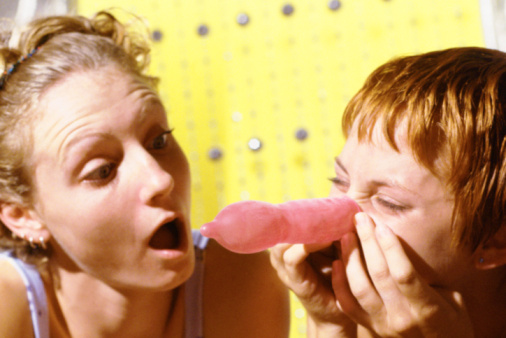Republished here with permission from The Good Men Project.
I’m the older of two children. When my little sister was born, I was three and a half years old, and I got some version of the story of where babies come from.
Later, when I was old enough to be curious about puberty, I read a lot of books and pamphlets about sexual reproduction and a very few about sexuality. It was here that I first learned about masturbation.
I think we can do better at educating children about their sexuality, in several ways. We can begin by teaching our children to know their bodies. It’s part of mastery of such skills as comforting oneself to fall asleep, eating to fullness, knowing when you’re going to sneeze, or have to go to the bathroom. In similar ways, we teach our kids emotional mastery: to trust their “gut sense” that something is wrong, to know when they’re in a rage and how to calm down.
Touching our genitals for pleasure and comfort is a universal human phenomenon. Children, even infants and fetuses, appear to enjoy touching their own genitals. This should come as no surprise, since they are so richly sensitive to touch. Yet when we talk to our small children about their bodies, we don’t usually talk to them about pleasure, of any kind, or of their felt experiences in their own bodies. And the way we direct these conversations affects how children see themselves: as girls and boys with human desires. We talk about penises and vaginas, the tab A and slot B of sexual reproduction. We don’t talk about penises and clitorises, the homologous organs of sexual pleasure.
We do this on the grounds that it is age-appropriate, but sexual reproduction is not yet part of the lives of small children. Young children are concrete: they are best prepared to understand what they can touch and see, not things and processes that are invisible or hypothetical. There are countless books available for parents to read to their preschool-age children, explaining sexual reproduction. We teach little kids more about how we sexually reproduce than we do about digestion, or sleep. We could teach our children so much more about how to listen to their bodies, and how to talk about them with their parents and trusted caregivers.
We must teach our children about their bodies, both to protect them from predators who prey on shame and confusion, and so they can grow into sexually healthy adolescents and adults. This includes the knowledge that their bodies are their own, and that they may touch any part of themselves out of curiosity or pleasure. That every part of the body belongs, has a name, is natural and good.
If you’re uncomfortable talking to your children about touching themselves for pleasure, you can begin by talking about the subjective experiences of our bodies in other ways. You could talk about the digestive process with a young child who has just eaten a sandwich. Why do we eat? What tastes good? How does it feel to eat? To be full? These are questions a three-year-old can learn the answers to, and that you can talk about from your own experience. These aren’t lessons in biology: they’re lessons in how to have a human body.
We’re anxious about children’s sexuality, because their sexuality is taboo to us. Unlike eating and even going to the bathroom, sexual touch is not something we may ever appropriately teach children through demonstration. Men, particularly, are considered sexually dangerous to children, making it more difficult to break through the fear of doing something wrong while teaching our kids some of the most important lessons they’ll learn in their whole lives. There are few tools to help parents talk about sexuality to children at very young ages. Early childhood includes potty training and teaching children limits on when and where they may take off their clothes or touch themselves. If learning to potty train a child without conveying messages about being dirty is difficult, teaching them about touching their genitals can be that much harder, if you’ve been brought up with shame around masturbation.
Children’s sexuality is something that we can and should talk about with our kids. Instead of worrying that you can’t properly explain conception to a three-year-old, at least masturbation is a topic you can speak about from personal experience. Everybody masturbates, even three-year-olds. There is nothing wrong in telling your child that they can touch themselves, that it’s okay to touch yourself in ways that feel good. There’s nothing wrong with admitting to your child that everybody touches themselves this way. In fact, teaching them this might make them more secure than you were about your desires and your body when you were growing up. It’s a risk worth taking.
How do you talk to your kids about their sexuality? Know any good books for children? Share in the comments.
Justin Cascio is a writer, mainly on the subjects of food, bicycle commuting, and being queer. His food blogs are Justin Wants to Feed You, where he shares advice and recipes on eating sustainably, and Tin Foil Toque, where he writes long essays on the evils of industrial food. He has been a technical writer, sold home stereos, and worked for three years at his local co-op’s meat and seafood service counter. In the Aughties, Justin was one of three co-creator/editors of Trans-Health, a health and fitness magazine for trans people. His essay, “Local tomatoes,” was a recent Editor’s Pick on Salon. You can find him on Twitter @likethewatch.
Related Links:

